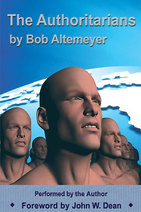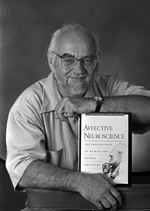|
Note: Bios are excerpted from the websites and professional resumes of the researchers.
Click on names to connect to more info. |
|
Robert Sapolsky, Ph.D is John A. and Cynthia Fry Gunn Professor of Biological Sciences and Professor of Neurology and Neurological Sciences at Stanford University. Sapolsky, a neuroendocrinologist, has focused his research on issues of stress and neuron degeneration, as well as on the possibilities of gene therapy strategies for help in protecting susceptible neurons from disease. In his well-known book Why Zebras Don't Get Ulcers: An Updated Guide to Stress, Stress-Related Diseases and Coping (Freeman 1994, second edition 1998), for example, Sapolsky examines how prolonged stress can cause or contribute to damaging physical and mental afflictions. His lab was among the first to document that stress can damage the neurons of the hippocampus. He is currently working on gene transfer techniques to strengthen neurons against the disabling effects of glucocorticoids. Sapolsky has received numerous honors and awards for his work, including the prestigious MacArthur Fellowship, an Alfred P. Sloan Fellowship, and the Klingenstein Fellowship in Neuroscience. He received the National Science Foundation Presidential Young Investigator Award and the Young Investigator of the Year Awards from the Society for Neuroscience, the Biological Psychiatry Society, and the International Society for Psychoneuro-Endocrinology. Author of numerous science articles, he is on the editorial boards of several journals, including the Journal of Neuroscience, Psychoneuroendocrinology, and Stress and is a contributing editor for The Sciences.
|
|
|
Dr. Bremner’s research has used neuroimaging and neurobiology measures to study the neural correlates and neurobiology of posttraumatic stress disorder (PTSD) related to combat and childhood abuse, as well as the related area of depression. He is one of the top three most highly cited researchers in the world in his field. His more recent work is expanding to look at the relationship between brain, behavior, including studies of heart disease and the brain, and the effects of medication on the brain. and physical health. Dr. Bremner has worked continuously throughout his career as a physician scientist, with the support of funding from two successive VA Career Development Awards, VA Merit Review, NIMH, DOD, and various private sources. His research includes studies of the neurobiology and assessment of PTSD, hippocampus and memory in PTSD and depression, neural correlates of declarative memory and traumatic remembrance in PTSD, PET measurement of neuroreceptor binding in mood and anxiety disorders, neural correlates of myocardial ischemia, and the effects of psychotropic and acne medication on brain function and structure. Other books include Brain Imaging Handbook and Does Stress Damage the Brain? Robert S. Pynoos, M.D., M.P.H., is Professor of Psychiatry in the UCLA Department of Psychiatry and Biobehavioral Sciences. He is Co-Director of the National Center for Child Traumatic Stress, Director of the UCLA Trauma Psychiatry Service and Executive Director of the UCLA Anxiety Disorders Section. Dr. Pynoos is a graduate of Harvard University and Columbia University Schools of Physicians & Surgeons and Public Health.
Over the past two decades, he has made significant contributions to understanding the impact of children's exposure to violence and disaster, and to elevating the standards of mental health care for child victims and witnesses. He has written extensively on child development and child traumatic stress, the neurobiology of child and adolescent trauma, and public mental health approaches for children and families after disaster, war and community violence. He has edited several widely respected books on posttraumatic stress in children and adolescents. He is past President of the International Society for Traumatic Stress Studies and the 2001 recipient of the Lifetime Achievement Award. Dr. Pynoos has served as Chair for the William T. Grant Consortium on Adolescent Bereavement and for the MacArthur Foundation Network Study Group on Children's Responses to Traumatic Stress. He served as a consultant to the United States Department of Education after the Oklahoma City bombing, to the Springfield Oregon Public School District after the Thurston High School shooting, to Jefferson County Mental Health after the Columbine High School tragedy and to Santana High School, Santee, California. He has been a consultant to UNICEF for Kuwait after the Gulf War, has a long-standing collaborative relationship with UNICEF to conduct a long-term post-war recovery program for adolescents in Bosnia-Herzegovina, and worked for years with the Armenian Relief Society in their decade-long post-earthquake recovery efforts. Dr. Pynoos was an invited participant to the 1999 White House Strategy Session on Children, Violence and Responsibility. He has received the American Psychiatric Association Bruno Lima Award for excellence in disaster psychiatry. Research Interests:
The Yale Intergroup Relations Lab is dedicated to the study of intergroup relations and diversity. Its goal is to understand (a) the processes leading to prejudice, stereotypes, and discrimination of racial and ethnic groups, sexual minorities, immigrants, and people with disabilities; (b) the experiences, adaptations, and resilience of members of stigmatized groups; and (c) how cultural bias and social power influence the nature of intergroup interactions in ways that create intergroup miscommunication and reinforce social prejudices, subtly contribute to social inequality, and hinder genuinely helpful interpersonal and intergroup behavior. Research in the Yale Intergroup Relations Lab incorporates a range of methodologies and techniques from social psychology, clinical psychology, political psychology, field research, social cognition, and neuroscience. Although experimental research is central, the work of the laboratory encompasses a range of different empirical approaches. Topics are international in scope and bridge basic research with applications for social policy and interventions to improve intergroup relations and promote social equality. |









